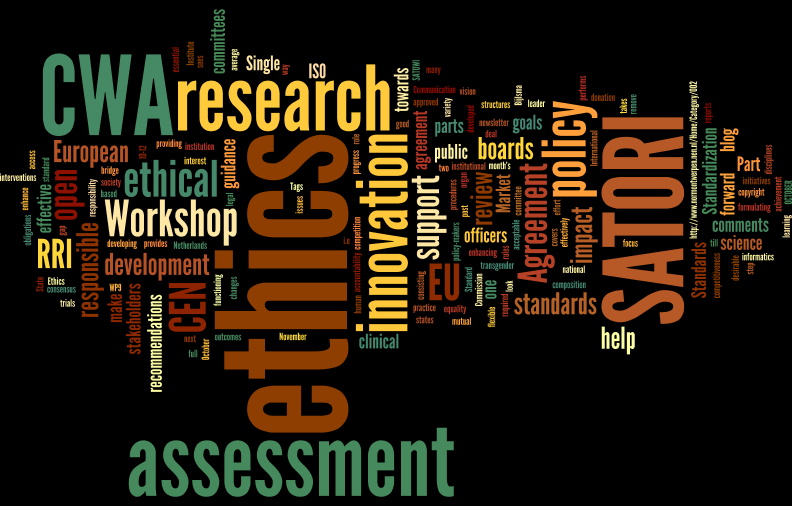
Our October newsletter covers a variety of topics: algorithmic accountability, changes to organ donation, citizen science, clinical trials, cloned human meat, ethics in design, gender equality, genome interventions, impact of ethics officers, informatics ethics review boards, modernisation of EU copyright rules, open access to clinical reports, open science, policy recommendations to enhance research and innovation, responsible research & innovation (RRI), SATORI CEN Workshop Agreement, SATORI mutual learning workshops, social responsibility (ISO 26000), standard for robots, transgender ethics, etc. Read the full issue here
This month’s blog focus is the SATORI CEN Workshop Agreement (CWA), which is open for public consultation till 30 November 2016.
A CEN Workshop Agreement is an agreement developed and approved in a CEN Workshop that is open to the direct participation of anyone with an interest in the development of the agreement. The development of a CWA is quick and flexible, and takes on average between 10-12 months.
Just like other CWAs, the SATORI CWA is not a full-fledged Standard. It is a consensus based, collaborative effort to bridge the gap between the vision and implementation of effective ethics assessment and responsible research & innovation (RRI).
The SATOWI CWA has two parts. Part 1 outlines recommendations for the composition, role, functioning and procedures of an ethics assessment unit (i.e. any institution or committee that performs ethics assessment – this includes, but is not limited to, research ethics committees, institutional review boards, ethical review committees, ethics boards, and units consisting of one or more ethics officers). Part 2 of the SATORI CWA provides stakeholders with guidance on how to conduct an ethical impact assessment. Together, both parts aim to help ethicists, policy-makers and other stakeholders deal effectively with the ethical issues and impacts of research and innovation.
Standards support policy-making goals by providing techniques, means and other requirements to support the achievement of such goals. The International Organization for Standardization (ISO) sees standards as “valuable support to public policy initiatives”. The European Commission Single Market Communication 550/2015 states, “Standards are crucial for innovation and progress in the Single Market: they increase safety, interoperability and competition and help remove trade barriers. They are essential for European competitiveness”. The move towards standardisation of ethics assessment in the EU through the development of the SATORI CWA is one step towards showcasing the EU globally as a leader in enhancing ethics and developing RRI standards.
Ethics has high priority in EU research policy. The SATORI CWA could support policy in many ways. The CWA could serve as a reference point in the European Commission’s and national Member State polices on ethics assessment. It could help ethics assessors in formulating effective and efficient ethics assessment processes and structures, particularly in scientific disciplines where they are next to non-existent, and guidance is required. It can facilitate compliance with ethical and legal obligations, established standards and good practice. Marlou Bijlsma, of the Netherlands Standardization Institute (NEN), comments that “The SATORI CWA could make the outcomes of research and innovation more acceptable and desirable for society.”
Here is your chance to make your voice heard in determining the way forward for EU ethics assessment! We look forward to your comments and feedback on the SATORI CWA.
Links: http://www.cen.eu/News/Workshops/Pages/WS-2016-010.aspx
http://www.normontwerpen.nen.nl/Home/Category/002
Tags: CEN Workshop Agreement, ethics assessment, ethical impact assessment, RRI, responsible research, ethics policy
